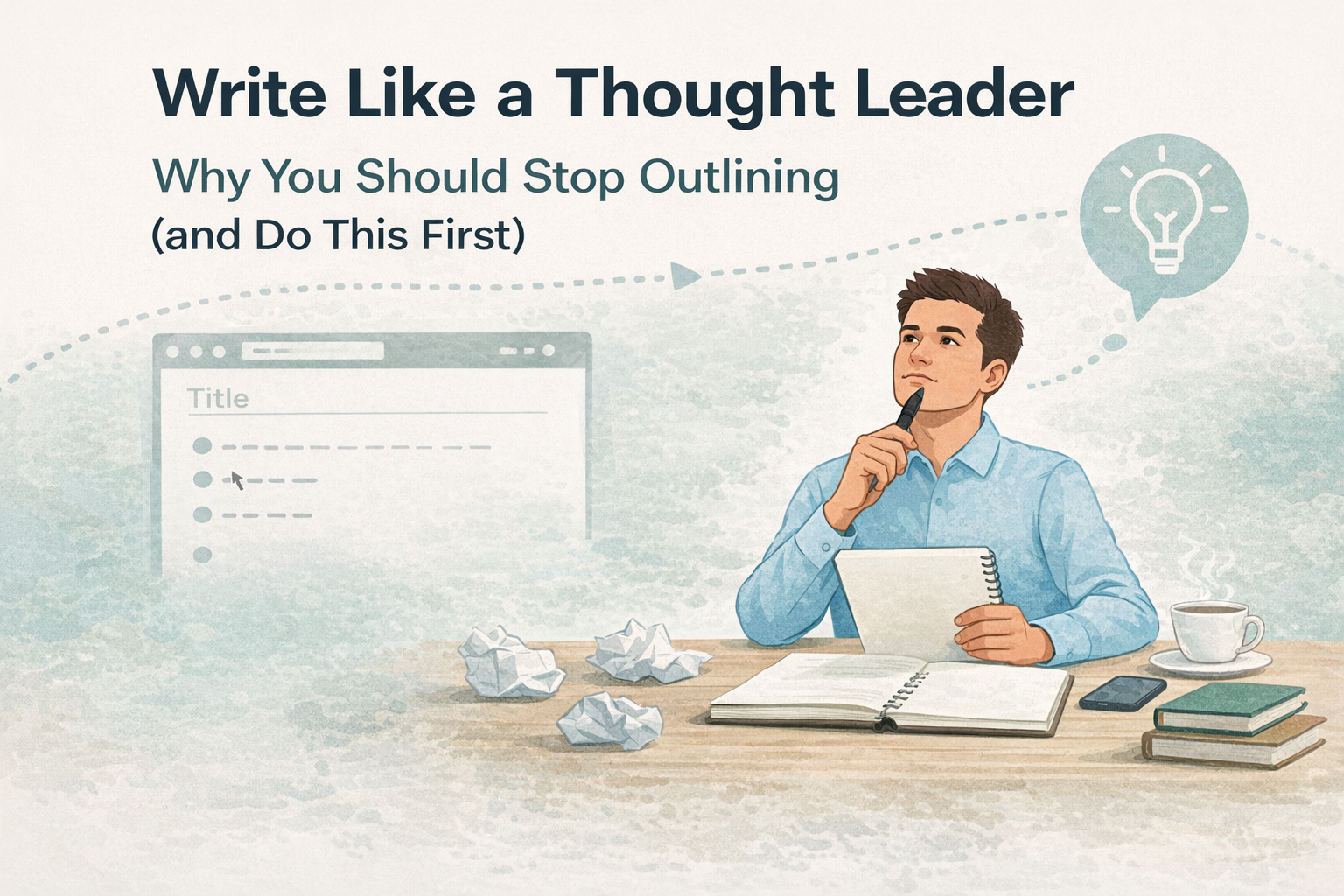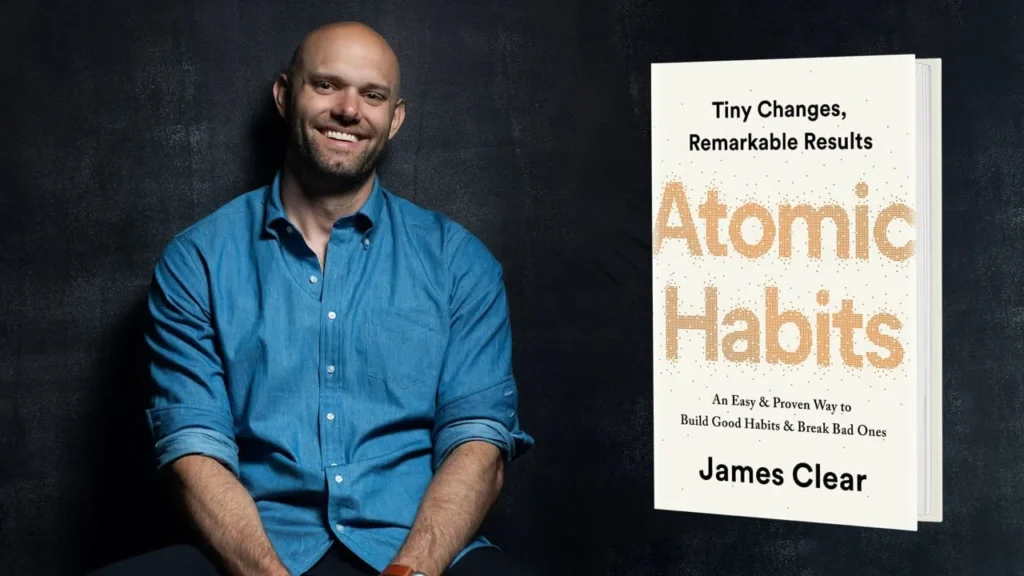Write Like a Thought Leader: Why You Should Stop Outlining (and Do This First)
Most authors start every book the same way:
Open a document.
Write an outline.
Stare at it.
Then stall.
Outlining feels like progress — it’s structured, linear, and feels productive. But for thought leadership books, it’s often the wrong first step.
The most compelling chapters aren’t born from outlines.
They’re born from clarity of idea, not structure.
This post overturns the traditional “outline first” instruction and gives you a repeatable discovery framework that leads to stronger thinking and smoother writing. It’s about thinking on the page before you map the page.
We call this creating your "Author Brain," and what we discovered in when authors do this first, 90% of them go on to finish their book... on time.
Here's how you can do the same.
Who this is for
This is for you if you’ve ever:
- stared at your table of contents like it’s a blank page
- rewritten your outline more than your manuscript
- felt unsure what your chapter is actually about
- structured before you understood
The reason isn’t lack of skill. It’s lack of clarity before structure.
The Modern Author lesson
Clarity comes before structure.
Don’t outline what you think you want to say.
Write to discover what you actually need to say.
Outlining is a tool for people who already know what they mean.
Most authors don’t start there — they start with ideas that are hazy, half-formed, or contradictory.
So the first job isn’t outlining.
It’s thinking on the page — exploring your idea until it starts to reveal a natural shape.
The Problem with Outlining First
Outlines assume clarity that often doesn’t exist.
When you start with a table of contents, you’re implicitly saying:
- “I already know the structure”
- “I already know the key ideas”
- “I can organize before thinking”
That rarely matches reality.
Outlining first usually leads to:
- chapters that feel flat
- ideas that looked good in headings but collapse in prose
- endless re-outlining instead of writing
The real bottleneck isn’t lack of structure.
It’s lack of discovered thinking.
The Discovery-First Framework
This alternative sequence has one purpose:
Let your thinking create the structure, not the other way around.
Here’s how the strongest thought leaders actually work:
Step 1) Start with a claim — not an outline
Write one tentative sentence that you believe might be true.
Examples:
- “The biggest mistake thought leaders make is outlining too soon.”
- “Clarity comes from writing, not planning.”
- “Ideas reveal themselves before structure ever does.”
This sentence isn’t your thesis. It’s your entry point.
Why this works:
A claim creates motion. An outline creates a cage.
Step 2) Write to explore the idea
Write 500–800 words with one rule:
Do not edit. Do not outline. Do not shape.
Your job is to:
- describe what you think
- test the idea against examples
- explore contradictions
- find where you keep returning
This phase is messy. That’s the point.
Why this works:
Structure hides uncertainty. Writing reveals it.
Step 3) Circle the energy
After the messy draft, highlight:
- sentences that feel alive
- moments where insight appeared
- repetition of key patterns
- parts that got easier to write
Ignore transitions, order, and logic for now.
You’re looking for signal, not polish.
Why this matters:
Energy precedes structure. The shape comes from what resonates.
Step 4) Extract your real structure
Now, and only now, outline.
But this outline isn’t hypothetical.
It’s based on what you already wrote.
Your chapters will naturally reveal:
- a core tension
- repeated themes
- supporting ideas
- a clear takeaway
Turn those into your table of contents.
Why this works:
You’re structuring discovered thinking, not guesswork.
Step 5) Rewrite with intent
Now rewrite cleanly.
Use:
- sharper opening sentences
- clearer throughlines
- fewer but better developed ideas
- a concrete takeaway at the end
This is where craftsmanship matters.
Why this works:
Structure amplifies clarity instead of attempting to force it.
How This Shows Up in Manuscripts Projects
Authors trapped in outline paralysis almost always have the same symptom:
They’re organizing ideas they haven’t yet formed.
In the Manuscripts workflow, we often see these patterns:
- chapter headings get rewritten five times
- opening paragraphs never arrive
- writers switch chapters instead of finish them
- drafts linger in half-thought limbo
When authors flip the sequence — discovery first, structure second — progress accelerates dramatically:
- ideas become sharper faster
- writing feels easier
- chapters actually get finished
This is the difference between thinking about your book and thinking in your book.
For may authors, we recommend they leverage our Codex tool, which lets them upload blog posts, articles, their LinkedIn bio, papers, transcripts, etc., then use that to begin to organize.
We call this creating your "Author Brain," and its a powerful way to discover (with help), before you start writing.
Evidence It Works
Pattern Evidence
Across hundreds of nonfiction authors, the most successful chapters start as messy drafts, not polished outlines.
Writing Cortex Evidence
Writers produce clearer prose when they discover ideas in motion rather than impose structure first.
Outcome Evidence
Authors who follow discovery first:
- draft faster
- revise with confidence
- finish more consistently
The structure becomes the echo of the idea — not its source.
When Outlining Still Works First
Outlining first works best when:
- the argument is already fully formed
- the ideas are stable and practiced
- the author can say the chapters out loud before writing
This happens often in technical or procedural writing.
It’s rare in idea-driven, thought leadership books.
Common Mistakes (and How to Fix Them)
Mistake: Writing the outline because it “feels productive.”
Fix: Write one messy draft to test the idea’s real shape.
Mistake: Editing while discovering.
Fix: Separate discovery (writing) from refinement (editing).
Mistake: Keeping everything you wrote.
Fix: Cut ruthlessly once clarity appears.
A Simple Template You Can Copy
- Claim: “I think this might be true…”
- Discovery Draft: 500–800 words, no editing
- Circle Energy: Highlight the parts that sing
- Extract Structure: Build an outline from resonance
- Rewrite: Clarity first, structure second
This is writing as thinking, not planning as thinking.
Quick FAQ
Should I outline before writing a book chapter?
Not usually. Start by exploring your idea in prose first, then create an outline from what actually worked.
Why does outlining first feel easier?
Because it feels organized. But that organization is often fictional — it hasn’t been tested by real writing yet.
How many words should my discovery draft be?
Aim for 500–800 words per idea cluster. More than that and you lose momentum. Less than that and you don’t explore deeply enough.
The Bottom Line
Outlines don’t create clarity.
Clarity creates outlines.
If you want thought leadership that thinks clearly on the page, you can’t start with structure. You have to write to discover — then let the structure emerge from what you’ve found.
Outlining is not obsolete.
It’s just premature when used as a first step.
→ Schedule Your Free Strategy Call
About the Author
Eric Koester is an award-winning entrepreneurship professor at Georgetown University, bestselling author, and founder of Manuscripts, the Modern Author OS used by more than 3,000 authors. His work has helped creators turn ideas into books, books into brands, and brands into scalable businesses.
About Manuscripts
Manuscripts is the leading full-service publishing partner for modern nonfiction authors. We help founders, executives, coaches, and experts turn their books into growth engines, through positioning, coaching, developmental editing, design, AI-enhanced writing tools, and strategic launch systems. Manuscripts authors have sold thousands of books, booked paid speaking gigs, landed media features, and generated millions in business from their IP.
Work With Us
If you’re writing a book you want to matter, let’s map out your Modern Author Plan.
👉 Schedule a Modern Author Strategy Session → https://write.manuscripts.com/maa-web
👉 Explore Manuscripts Publishing Services → https://manuscripts.com/publish-with-us/
👉 See Modern Author Success Stories → https://manuscripts.com/authors/
Modern Author Resources
- How to Write a Book if You’re Busy
- Modern Ghostwriting for Nonfiction Authors
- AI Tools for Authors in 2026
- How to Build an Audience Before You Write Your Book
- The Evergreen Launch System for Modern Authors
Powered by Codex: The Modern Author Author Intelligence Tool






 It's simple, and that's why it works.
It's simple, and that's why it works.
 I'm starting my next book this summer as a part of the
I'm starting my next book this summer as a part of the 
